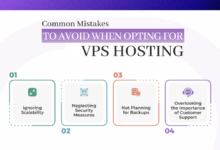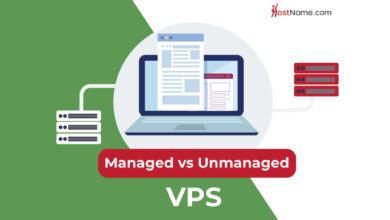VPS Hosting vs Dedicated Servers: Better Value?
VPS Hosting vs Dedicated Servers: Which One Offers Better Value? Choosing the right hosting solution is crucial for website success. This decision hinges on understanding the nuanced differences between Virtual Private Servers (VPS) and dedicated servers. Both offer distinct advantages, impacting performance, security, cost, and control. This comprehensive comparison will help you navigate the complexities and make an informed choice tailored to your specific needs and budget.
We’ll delve into the technical aspects of each option, exploring resource allocation, scalability, security features, and management requirements. By examining real-world use cases and considering your technical expertise, we’ll guide you toward the optimal hosting solution, maximizing value and ensuring a smooth, efficient online experience. A detailed cost analysis and a decision matrix will further aid in your selection process.
Defining VPS Hosting and Dedicated Servers
Choosing between VPS hosting and a dedicated server is a crucial decision for businesses and individuals alike, depending on their specific needs and budget. Understanding the core differences between these two types of hosting is essential for making an informed choice. This section will clarify the key characteristics of each, enabling a more effective comparison.
VPS hosting, or Virtual Private Server hosting, is a virtualization technology that divides a single physical server into multiple virtual servers. Each VPS functions as a standalone server, offering users dedicated resources such as RAM, CPU, and storage, but these resources are shared with other VPS instances on the same physical hardware. This sharing contributes to the cost-effectiveness of VPS hosting. Key characteristics include isolated operating systems, root access (often), and scalable resources, allowing for flexibility as needs change. Think of it like apartment living: you have your own space (VPS), but share some common infrastructure (physical server) with your neighbors.
Dedicated servers, on the other hand, provide users with exclusive access to an entire physical server. This means the entire server’s processing power, memory, and storage are dedicated solely to a single client. This results in superior performance, enhanced security, and complete control over the server’s configuration. Unlike VPS hosting, there’s no resource sharing. The entire machine is yours, offering unparalleled control and predictability. This is akin to owning a whole house – complete privacy and control over all aspects.
Resource Allocation and Control in VPS Hosting and Dedicated Servers
A significant difference between VPS and dedicated servers lies in resource allocation and the level of control offered. VPS hosting provides a dedicated allocation of resources, but these resources are still constrained by the underlying physical server’s capabilities. If many VPS instances on the same physical server are heavily utilized, it can impact the performance of individual VPSs. Dedicated servers, however, offer guaranteed resources and complete control over the server’s hardware and software configurations. This allows for optimized performance and customization to meet specific application requirements.
In terms of control, dedicated servers offer the highest level of control. Users have root access, allowing them to install any software, configure the server as needed, and manage all aspects of the system. While VPS hosting also often provides root access, the level of control is still somewhat limited by the hypervisor and the hosting provider’s policies. For instance, users might have restrictions on certain kernel modifications or hardware access.
Cost Comparison
Choosing between VPS and dedicated servers often hinges significantly on budget. Understanding the pricing structures and influencing factors is crucial for making an informed decision. Both options offer varying levels of resources and performance, directly impacting their respective costs.
VPS and dedicated server pricing models differ, reflecting the resources and level of control offered. Several factors influence the final price, necessitating careful consideration of individual needs and long-term plans.
VPS Pricing Structures
VPS hosting typically follows a subscription-based model, with pricing tiers based on allocated resources like RAM, storage, and CPU cores. Prices usually range from a few dollars per month for basic plans to several hundred dollars for high-performance configurations. Contract lengths can also influence pricing, with longer-term commitments often resulting in lower monthly fees. Many providers offer pay-as-you-go options for greater flexibility. For example, a basic VPS plan might cost around $10-$20 per month, while a high-performance plan could cost $100-$300 or more.
Dedicated Server Pricing Structures
Dedicated servers, providing exclusive access to an entire physical server, generally command higher prices than VPS hosting. Pricing is influenced by server specifications (CPU, RAM, storage, bandwidth), location, and contract length. A basic dedicated server might start around $100 per month, while high-end configurations can cost thousands of dollars monthly. Longer-term contracts typically result in lower monthly costs. Furthermore, factors like the operating system and any additional managed services significantly impact the overall price. For instance, adding managed security or backups increases the monthly cost.
Factors Influencing VPS and Dedicated Server Costs
Several key factors contribute to the final cost of both VPS and dedicated servers. These include:
| Factor | VPS Impact | Dedicated Server Impact |
|---|---|---|
| Server Specifications (CPU, RAM, Storage) | Higher specs = higher cost; directly proportional | Higher specs = higher cost; directly proportional |
| Bandwidth | Higher bandwidth = higher cost | Higher bandwidth = higher cost; substantial impact on price |
| Operating System | Minimal impact; often included | Can significantly impact cost; licensing fees apply |
| Contract Length | Longer contracts often lead to discounts | Longer contracts often lead to discounts |
| Managed Services | Optional; adds to the cost | Often customizable; significantly impacts price |
Cost-Effectiveness Comparison
The cost-effectiveness of VPS vs. dedicated servers depends heavily on the specific use case.
| Usage Scenario | VPS Cost-Effectiveness | Dedicated Server Cost-Effectiveness |
|---|---|---|
| Small Website/Blog | High; cost-effective solution | Low; overkill and unnecessarily expensive |
| E-commerce Store (Medium Traffic) | Moderate; potentially cost-effective depending on traffic | Moderate; justifiable if high traffic and performance are critical |
| High-Traffic Website/Application | Low; may lack resources for optimal performance | High; provides the necessary resources for optimal performance |
| Gaming Server | Low; typically requires dedicated resources for optimal performance | High; provides the necessary control and resources |
Performance and Scalability
Choosing between VPS hosting and a dedicated server often hinges on performance and scalability needs. While both offer significant advantages over shared hosting, their capabilities differ considerably, impacting application speed, resource availability, and the ability to handle increasing workloads. Understanding these differences is crucial for making an informed decision.
VPS hosting provides a virtualized environment, meaning you share the physical server’s resources with other users. Dedicated servers, conversely, provide exclusive access to the entire server’s hardware. This fundamental difference significantly impacts performance and scalability.
VPS Hosting Performance and Uptime
Virtual Private Servers (VPS) offer a good balance between performance and cost. Their speed is generally faster than shared hosting because resources are not as heavily divided. Uptime typically ranges from 99.5% to 99.9%, depending on the provider and their infrastructure. Factors influencing VPS performance include the quality of the underlying hardware, the virtualization technology used (e.g., KVM, Xen), and the number of virtual servers hosted on the physical machine. A well-managed VPS with sufficient resources allocated will provide satisfactory performance for many applications. However, performance can be impacted if other users on the same physical server experience high resource demands.
VPS Hosting Scalability Options and Limitations
VPS hosting offers scalability, but it’s limited compared to dedicated servers. Scalability typically involves upgrading to a VPS plan with more RAM, CPU cores, or storage. Some providers offer “on-demand” scaling, allowing you to temporarily increase resources as needed. However, these upgrades often require downtime or manual intervention. The fundamental limitation is the shared nature of the physical server. Even with upgrades, your performance can still be impacted by other users on the same server. A significant increase in traffic or resource demands might necessitate a migration to a dedicated server or a larger VPS.
Dedicated Server Performance and Scalability
Dedicated servers provide superior performance and scalability compared to VPS hosting. Because you have exclusive access to all server resources, performance is consistently high and unaffected by other users. Uptime is typically very high, often exceeding 99.9%. Scalability is also more flexible. You can easily upgrade individual components like RAM, CPU, or storage as needed, often without any downtime. Furthermore, the server’s operating system and software can be fully customized to optimize performance for specific applications. The cost is naturally higher, but the performance and control justify the expense for demanding applications or rapidly growing businesses. For example, a large e-commerce platform requiring high availability and the ability to handle peak traffic loads would benefit significantly from the performance and scalability of a dedicated server.
Security Considerations
Choosing between VPS hosting and a dedicated server involves careful consideration of security implications. Both offer varying levels of control and inherent risks, impacting your data protection and overall system integrity. Understanding these differences is crucial for making an informed decision aligned with your specific security needs and budget.
VPS hosting and dedicated servers present distinct security profiles. While dedicated servers generally offer greater control and isolation, VPS environments, sharing physical hardware, introduce potential vulnerabilities. Effective security strategies are essential regardless of the chosen hosting type, requiring proactive measures to minimize risks.
Security Risks of VPS Hosting and Mitigation Strategies
The shared nature of VPS hosting introduces several potential security risks. A compromised neighboring VPS could potentially affect your server through vulnerabilities in the underlying hypervisor or shared resources. Furthermore, less granular control compared to dedicated servers means relying on the provider’s security infrastructure. Effective mitigation involves selecting a reputable provider with robust security measures, regularly patching your operating system and applications, employing strong firewalls and intrusion detection systems, and implementing secure coding practices. Regular security audits and penetration testing can also identify and address vulnerabilities before they are exploited. Finally, utilizing strong passwords and multi-factor authentication are crucial for user account security.
Security Features of Dedicated Servers
Dedicated servers offer a higher degree of security due to complete physical and software isolation. This eliminates the risk of compromise from neighboring servers. Administrators have complete control over the server’s hardware and software configurations, allowing for the implementation of customized security measures tailored to specific needs. Typical security features include dedicated firewalls, intrusion detection/prevention systems (IDS/IPS), and the ability to install and configure advanced security software. The administrator also has the option to implement regular backups, secure remote access protocols, and robust access control lists (ACLs) to further enhance security.
Comparison of Security Levels and Control
Dedicated servers provide a significantly higher level of security and control compared to VPS hosting. The complete isolation from other users drastically reduces the risk of shared vulnerabilities and potential attacks. The level of control afforded to the administrator allows for the implementation of highly customized security protocols. However, this increased control also necessitates a greater level of technical expertise for effective security management. VPS hosting, while offering a more affordable option, necessitates reliance on the provider’s security infrastructure and may present higher risks due to shared resources. The choice between the two depends on the organization’s security needs, technical expertise, and budget constraints. A business handling sensitive data or requiring the highest level of security will generally opt for a dedicated server. Smaller businesses or those with limited technical resources may find a well-managed VPS hosting environment sufficient.
Control and Management
Choosing between VPS hosting and a dedicated server often hinges on the level of control and management required. Both offer varying degrees of administrative power, influencing your technical expertise needs and overall operational costs. Understanding these differences is crucial for selecting the best option for your specific needs.
VPS hosting provides a significant degree of control, although less than a dedicated server. Users typically manage their operating system, applications, and software configurations within the confines of their virtualized environment. This allows for customization and optimization tailored to specific project needs. However, underlying infrastructure management like hardware maintenance and network configuration usually remains the responsibility of the hosting provider.
VPS Hosting Control
With VPS hosting, users generally have root or administrative access to their virtual machine. This means they can install and configure software, manage users and permissions, and optimize server settings to enhance performance and security. However, the level of control is limited by the virtualization technology used and the hosting provider’s policies. For example, users might not have direct access to the underlying hardware or the ability to modify certain kernel parameters. Popular control panels like cPanel or Plesk offer simplified management interfaces, streamlining common tasks and reducing the need for extensive command-line expertise.
Dedicated Server Control
Dedicated servers offer the highest level of control. Users have complete administrative access to the entire server, including the operating system, hardware, and network configuration. This allows for unparalleled flexibility and customization, enabling users to fine-tune the server environment to meet the most demanding requirements. For example, they can choose the specific operating system, install custom kernels, and optimize hardware settings for maximum performance. This level of control, however, necessitates a higher level of technical expertise.
Management Responsibilities
The management responsibilities differ significantly between VPS and dedicated servers. With VPS hosting, the provider manages the underlying hardware, network infrastructure, and security of the physical server. Users are responsible for managing their virtual machine’s operating system, applications, and security within their allocated resources. Dedicated servers, on the other hand, shift almost all management responsibilities to the user. This includes hardware maintenance, operating system updates, security patching, and network configuration. This increased responsibility requires significant technical skills or the employment of system administrators. Outsourcing server management to a third-party provider is a viable option for users lacking the necessary expertise, but it adds to the overall cost.
Technical Expertise Required
Choosing between VPS hosting and a dedicated server significantly impacts the level of technical expertise needed for effective management. While both options offer varying degrees of control, the required skills and knowledge differ substantially. Understanding these differences is crucial for making an informed decision based on your technical capabilities and resources.
VPS hosting generally requires a moderate level of technical proficiency. While managed VPS services often handle many aspects of server maintenance, users still need some foundational understanding of server administration. A dedicated server, however, demands significantly more expertise.
VPS Hosting Technical Requirements
Managing a VPS effectively requires familiarity with command-line interfaces (CLIs), basic server administration tasks, and an understanding of networking concepts. Users should be comfortable with tasks such as installing and configuring software, managing files and directories, troubleshooting basic network issues, and monitoring server performance. While some managed VPS providers offer features that simplify these tasks, a foundational understanding remains essential for optimal performance and efficient problem-solving. For example, users might need to configure security measures like firewalls, manage user accounts, and install updates. A lack of these skills could lead to vulnerabilities or performance issues.
Dedicated Server Technical Requirements
Managing a dedicated server demands a high level of technical expertise. Users need advanced knowledge of operating systems, networking, security protocols, and server hardware. Tasks extend beyond basic server administration to include advanced troubleshooting, performance optimization, security hardening, and potentially even hardware maintenance. For instance, managing a dedicated server might involve configuring complex network setups, optimizing database performance, implementing advanced security measures, and resolving hardware malfunctions. The responsibility for all aspects of the server’s functionality rests solely with the user, requiring substantial technical skill and experience. Lack of expertise could result in significant downtime, security breaches, and substantial financial losses.
Comparison of Technical Requirements
| Feature | VPS Hosting | Dedicated Server |
|---|---|---|
| Operating System Management | Basic to Intermediate | Advanced |
| Networking Configuration | Basic to Intermediate | Advanced |
| Security Management | Basic to Intermediate | Advanced |
| Hardware Management | Minimal to None (usually handled by provider) | Advanced |
| Troubleshooting | Basic to Intermediate | Advanced |
| Software Installation and Configuration | Basic to Intermediate | Advanced |
Suitable Use Cases for VPS Hosting
VPS hosting offers a compelling balance of cost, performance, and control, making it ideal for a wide range of applications. Its scalability and customization options cater to both small businesses and growing enterprises needing more resources than shared hosting but less commitment than a dedicated server. Understanding the best use cases for VPS hosting is crucial for businesses seeking optimal performance and cost-effectiveness.
VPS hosting is particularly well-suited for applications requiring dedicated resources, moderate control, and predictable performance. Unlike shared hosting, where resources are pooled among multiple users, a VPS provides a dedicated slice of server resources, ensuring consistent performance even during periods of high traffic. This predictable performance is crucial for applications where downtime is unacceptable or negatively impacts the user experience.
Website Hosting for Small to Medium-Sized Businesses
Many small and medium-sized businesses (SMBs) find VPS hosting to be the perfect solution. The scalability allows them to start small and easily upgrade as their website traffic and storage needs increase. This eliminates the need for costly upfront investments associated with dedicated servers, allowing SMBs to allocate resources more effectively. Examples include e-commerce sites with moderate traffic, business blogs with substantial content, and corporate websites with interactive features.
Hosting Applications Requiring Moderate Resources
Applications requiring moderate computing power, memory, and storage benefit significantly from VPS hosting. These applications may not demand the raw power of a dedicated server, but still require more resources than shared hosting can reliably provide. Examples include: web applications with moderate database interactions, online forums with a substantial user base, and small-scale gaming servers.
Development and Testing Environments
VPS hosting provides an excellent environment for developers to create, test, and deploy applications. The ability to create multiple isolated environments allows developers to test different versions of software or configurations without impacting other projects or production systems. This isolation minimizes the risk of errors affecting live applications. This is crucial for agile development methodologies requiring frequent deployments and testing.
Email Servers and Mailing Lists
For businesses managing substantial email lists or requiring a robust email server, VPS hosting offers a reliable and scalable solution. Dedicated resources prevent email delivery issues often associated with shared hosting, ensuring emails reach their intended recipients without delays or interruptions. This is critical for businesses relying on email marketing campaigns or providing essential email services to their customers.
Table of Suitable Use Cases for VPS Hosting
| Use Case | Description | Resource Requirements | VPS Suitability |
|---|---|---|---|
| E-commerce Website | Online store selling products or services. | Moderate CPU, RAM, and storage; high bandwidth. | Excellent |
| Web Application | Software accessed via a web browser. | Variable, depending on complexity and user base. | Good to Excellent |
| Blog or Content Website | Website focused on publishing articles or other content. | Low to Moderate CPU, RAM, and storage; moderate bandwidth. | Good |
| Small Game Server | Server hosting a multiplayer game for a limited number of players. | Moderate CPU, RAM, and bandwidth; low storage. | Good |
Suitable Use Cases for Dedicated Servers
Dedicated servers offer unmatched power and control, making them ideal for applications demanding high performance, robust security, and extensive customization. They are the preferred choice when shared resources are insufficient or when complete control over the server environment is paramount. The superior performance and security features make them a valuable investment for organizations with critical applications and large-scale operations.
Several factors influence the suitability of a dedicated server. These include the application’s resource requirements (CPU, RAM, storage), the need for specialized configurations (specific operating systems, software stacks), and the sensitivity of the data being processed. Applications requiring significant processing power, high bandwidth, and low latency often benefit greatly from the dedicated resources offered by a dedicated server.
High-Traffic Websites and E-commerce Platforms
High-traffic websites and e-commerce platforms, especially those experiencing peak loads during promotional periods or sales events, require the consistent performance and scalability that only a dedicated server can provide. The dedicated resources ensure consistent response times and prevent downtime, crucial for maintaining customer satisfaction and maximizing sales. Examples include large online retailers, major news websites, and popular social media platforms that handle millions of requests daily.
Gaming Servers
Online gaming requires low latency and high bandwidth to provide a smooth and responsive gaming experience. Dedicated servers ensure consistent performance and minimize lag, enhancing the player experience. The dedicated resources allow for customization of server settings to optimize performance for specific games. Examples include massively multiplayer online role-playing games (MMORPGs), first-person shooters (FPS), and real-time strategy (RTS) games.
Database Servers
Databases containing large amounts of sensitive data benefit significantly from the enhanced security and control offered by dedicated servers. The isolated environment minimizes the risk of data breaches and allows for the implementation of robust security measures. This is crucial for applications where data integrity and confidentiality are paramount, such as financial institutions, healthcare providers, and government agencies.
Custom Applications and Software Development
Organizations developing and deploying custom applications or running specialized software often require a dedicated server to ensure compatibility and optimal performance. The ability to fully control the server environment allows for fine-tuning configurations and installing specific software packages necessary for the application’s functionality. This eliminates conflicts with other applications and guarantees optimal resource allocation.
Large-Scale Data Processing and Analytics
Applications involving large-scale data processing and analytics, such as scientific research, financial modeling, and big data analysis, require significant computing power and memory. Dedicated servers provide the resources needed to handle these demanding tasks efficiently, ensuring fast processing times and accurate results.
Use Cases and Dedicated Server Compatibility
| Use Case | Resource Requirements | Security Needs | Scalability |
|---|---|---|---|
| High-Traffic Website | High CPU, RAM, Bandwidth | High | High |
| E-commerce Platform | High CPU, RAM, Bandwidth, Storage | High | High |
| Gaming Server | High CPU, Low Latency, High Bandwidth | Medium | Medium |
| Database Server | High RAM, Storage, I/O | High | Medium |
| Custom Application | Variable | Variable | Variable |
| Data Processing | High CPU, RAM, Storage | Medium | High |
Support and Maintenance
Choosing between VPS hosting and a dedicated server often involves considering the level of support and maintenance each provides. Understanding these differences is crucial for making an informed decision, especially concerning potential costs and technical expertise required. Both options offer varying levels of support, impacting operational efficiency and overall cost.
Support and maintenance for VPS and dedicated servers differ significantly in several key aspects. The level of support offered, the response times, and associated costs vary greatly depending on the provider and the chosen service plan.
Support Channels and Response Times
VPS hosting providers typically offer a range of support channels, including email, phone, and live chat. Response times vary considerably, with some providers offering 24/7 support with immediate responses, while others might have longer response times, especially for less urgent issues. Dedicated server providers generally offer similar support channels but often provide more comprehensive support options, including dedicated account managers and potentially on-site support depending on the contract. Higher-tier dedicated server plans frequently guarantee faster response times through service level agreements (SLAs). For example, a premium dedicated server package might guarantee a response time of under one hour for critical issues, while a basic VPS plan might have a response time of several hours or even a business day.
Cost of Support and Maintenance
Support and maintenance costs are factored differently for VPS and dedicated servers. With VPS hosting, support is often included in the monthly fee, though the level of support might vary based on the chosen plan. Higher-tier VPS plans often include priority support and faster response times. Dedicated servers, however, may have support costs included in the base price, or they might be billed separately as an add-on service. This often involves higher costs, particularly for comprehensive support packages including proactive monitoring, server maintenance, and 24/7 access to expert technicians. For instance, a managed dedicated server service might add several hundred dollars per month to the base server cost, while a basic unmanaged dedicated server might only require occasional support calls at an hourly rate.
Proactive Monitoring and Maintenance
Proactive monitoring and maintenance are key differentiators between managed and unmanaged services for both VPS and dedicated servers. Managed VPS plans often include automated monitoring and alerts, ensuring issues are identified and addressed promptly. This proactive approach minimizes downtime and potential data loss. Similarly, managed dedicated server plans offer comprehensive monitoring and maintenance, with technicians proactively identifying and resolving potential issues before they impact performance. Unmanaged options, in contrast, place the responsibility of monitoring and maintenance squarely on the user. This can be advantageous for technically proficient users but requires significant time investment and expertise. A managed service offers peace of mind, but the cost reflects the additional labor and expertise involved.
Resource Utilization and Optimization
Efficient resource utilization is crucial for maximizing the performance and cost-effectiveness of both VPS and dedicated servers. Optimizing resource allocation ensures your applications run smoothly, preventing performance bottlenecks and unnecessary expenses. Understanding the differences in resource management between these two hosting options is vital for choosing the right solution and achieving optimal performance.
Optimizing Resource Utilization on a VPS
Optimizing resource utilization on a Virtual Private Server (VPS) involves a multi-faceted approach focused on both software and operational practices. Effective management minimizes resource contention with other users sharing the physical server.
Several strategies contribute to efficient VPS resource use. These include regularly monitoring CPU, RAM, and disk I/O usage through tools like htop or similar system monitors. Identifying resource-intensive processes allows for optimization or resource reallocation. Regular software updates are critical to patching vulnerabilities and ensuring optimal performance. Choosing lightweight applications and operating systems reduces the overall resource footprint. For database-heavy applications, optimizing database queries is crucial. This might involve indexing, query caching, and database tuning to minimize resource consumption. Furthermore, utilizing efficient scripting languages and code optimization techniques can significantly reduce the load on server resources.
Optimizing Resource Utilization on a Dedicated Server
Optimizing resource utilization on a dedicated server offers greater control compared to a VPS, as there is no resource sharing with other users. However, effective resource management remains essential for optimal performance and cost-efficiency.
On a dedicated server, optimization strategies often involve careful server configuration and application design. This includes properly sizing the server’s hardware to match anticipated workloads. Over-provisioning resources can be wasteful, while under-provisioning leads to performance issues. Efficient operating system and application configurations are paramount. This may involve tuning kernel parameters for optimal performance, utilizing caching mechanisms, and employing load balancing techniques for high-traffic applications. Regular server maintenance, including software updates and security patching, is crucial. Monitoring server resource usage, identifying bottlenecks, and proactively addressing them prevents performance degradation. Finally, employing robust monitoring tools allows for proactive identification and resolution of performance issues before they impact users.
Comparison of Resource Utilization Efficiency
Dedicated servers inherently offer more efficient resource utilization compared to VPS hosting. This stems from the exclusive access to server resources, eliminating the potential for resource contention with other users. While a well-optimized VPS can achieve high performance, the shared nature of the underlying hardware introduces limitations. A dedicated server provides predictable and consistent performance, crucial for applications requiring dedicated resources. However, the efficiency gains of a dedicated server come at a higher cost, making VPS a more cost-effective option for many users. The choice depends on the specific application requirements and budget constraints. For example, a high-traffic e-commerce website might benefit significantly from the predictable performance of a dedicated server, whereas a small blog might be adequately served by a well-optimized VPS.
Choosing the Right Hosting Solution
Selecting the appropriate hosting solution—VPS or dedicated server—depends on a careful evaluation of your specific needs and resources. This decision hinges on several key factors, including budget, technical expertise, and the demands of your applications. A structured approach, such as utilizing a decision matrix, can greatly simplify this process.
Decision Matrix for VPS vs. Dedicated Server
The following matrix provides a framework for comparing VPS and dedicated server hosting based on critical factors. Consider each factor’s relevance to your project and weigh the pros and cons of each hosting type accordingly.
| Factor | VPS Hosting | Dedicated Server |
|---|---|---|
| Budget | Generally more affordable, offering various pricing tiers. Suitable for smaller businesses or projects with moderate resource needs. | Significantly more expensive due to exclusive resource allocation. Best suited for large enterprises or projects requiring high performance and complete control. |
| Technical Expertise | Requires moderate technical skills for server management and configuration. Managed VPS options reduce this requirement. | Demands significant technical expertise for server administration and maintenance. Requires in-depth knowledge of operating systems and networking. |
| Application Requirements | Suitable for websites with moderate traffic, web applications, and smaller databases. Scalability options allow for growth. | Ideal for high-traffic websites, demanding applications, large databases, and resource-intensive tasks requiring guaranteed performance. |
| Scalability | Offers scalable resources, allowing you to upgrade or downgrade as needed. This provides flexibility to adapt to changing demands. | Scalability involves upgrading to a more powerful server. While possible, it’s less flexible and often requires more planning than VPS scaling. |
| Security | Shared security with other users on the same physical server. However, robust security measures can be implemented. | Offers enhanced security due to exclusive server access. Provides greater control over security configurations and policies. |
| Control and Management | Offers a degree of control over server settings and configurations. Managed VPS options limit this control. | Provides complete root access and control over the server’s hardware and software. |
Example Scenario: A Small E-commerce Business
Consider a small e-commerce business anticipating moderate traffic initially. Their budget is limited, and their technical expertise is moderate. Based on the decision matrix, a VPS hosting solution would likely be the more cost-effective and manageable option. As the business grows and traffic increases, they can easily scale their VPS resources to meet the increased demand. A dedicated server would be unnecessarily expensive and complex at this stage.
Example Scenario: A Large Gaming Company
Conversely, a large gaming company launching a massively multiplayer online game (MMOG) would require a dedicated server. The high traffic volume, demanding application, and critical need for consistent performance necessitate the guaranteed resources and control offered by a dedicated server. The cost is justified by the critical nature of the application and the potential revenue generated.
Closing Notes
Ultimately, the choice between VPS hosting and a dedicated server depends on your individual needs and priorities. While dedicated servers offer superior performance and security, they come with a higher price tag and require more technical expertise. VPS hosting provides a balance between performance, cost, and ease of management, making it ideal for many users. By carefully considering the factors discussed – cost, performance, security, control, and technical expertise – you can confidently select the hosting solution that delivers the best value for your specific website or application.









